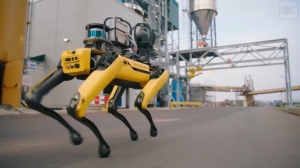


(Posted on 07/10/25)
Cargill has introduced Boston Dynamics’ four-legged robot, Spot, at its Amsterdam Multiseed crush and refinery plant to support daily inspections, identify hazards in real time, and enhance operational reliability. The AI-powered robot uses advanced sensors and real-time data collection to detect equipment and safety risks—helping keep operations running smoothly while protecting the people behind them.
Spot performs approximately 10,000 autonomous inspections per week, capturing thermal, acoustic, and visual data across rapeseed and sunflower processing lines. The robot identifies maintenance issues such as equipment overheating, product leaks, and ventilation faults - alerting operators before problems arise.
In one case, Spot detected a decanter running above safe operating limits. Maintenance teams made immediate adjustments, preventing equipment failure and avoiding significant downtime. In another, Spot flagged bearings fluctuating between 40°C and 100°C, prompting lubricant replacement before damage occurred.
“Spot gives us peace of mind overnight and helps us wake up to data - not surprises,” said Martin Blommestijn, Plant Superintendent at Cargill Amsterdam. “It’s more than just a robot - it’s an early warning system that helps keep production safe and smooth.”
Spot also scans for hazards such as open doors, misplaced equipment, or obstructed walkways—complementing Cargill’s rigorous safety standards with an extra layer of digital visibility.
Spot’s deployment is also changing how Cargill employees work—and how they feel about the future of food manufacturing. By automating repetitive tasks and increasing digital visibility, operators are shifting from manual oversight to data-informed decision-making.
Team members are gaining skills in programming autonomous missions, interpreting real-time inspection data, and using smart technologies to improve plant performance. This workplace transformation is part of Cargill’s commitment to building a more attractive, innovative environment for the next generation of talent.
“We are building a new working environment where automation, digitalisation and AI support our teams to make our manufacturing and supply chains safer and more efficient,” said Chris Kassios, Smart Manufacturing Process Lead at Cargill. “When employees see that we’re investing in their tools and training, it shows that we’re investing in their future too.”
Following successful testing and team training completed earlier this year, Cargill is evaluating how Spot could scale across other European operations. The pilot is a key step toward more predictive, digital-first plant management—positioning Cargill at the forefront of safe, efficient and talent-forward food production.
“This pilot is just the beginning,” added Kassios. “Robotics and AI are helping us build a food system that’s not only more efficient, but more resilient, sustainable, and human-centric.”
ADM and Bayer have announced a three-year extension of their partnership to support farmers in Maharashtra... Read more
The National Grain and Feed Association (NGFA) has applauded Senator Deb. Fischer’s (R-Neb.) reintroduction... Read more
Anglo American plc and Teck Resources Limited have received regulatory approval from the Government... Read more
The Rhodes Ridge Joint Venture has approved a $191 million (A$294 million) (Rio Tinto share $96 million... Read more
Trafigura Group Pte Ltd, a global leader in the commodities industry, has announced its financial results... Read more
Rio Tinto has successfully produced the first copper from the Johnson Camp mine in Arizona using its... Read more
The American Soybean Association’s World Initiative for Soy in Human Health programme and the... Read more
Karlka Nyiyaparli Aboriginal Corporation (KNAC) Registered Native Title Body Corporate and Rio Tinto... Read more
OCI Global, a leading global producer and distributor of nitrogen products has announced that it has... Read more
In December 2024, SSAB was granted a permit by the Land and Environment Court at Umeå District... Read more